Housing sales to foreign buyers more than doubled in Greater Victoria from September to October, prompting the B.C. government to increase scrutiny of the region’s real estate market.
The latest statistics show foreign nationals involved in 55 sales in October compared with 27 the previous month, while their share of total sales jumped to 6.3 per cent from 3.3 per cent.
The value of the sales to foreign buyers nearly tripled to $54 million from $19 million.
Finance Minister Mike de Jong said the province is monitoring the situation to see whether a 15 per cent tax on foreign buyers in Metro Vancouver is driving offshore money to the capital region.
“The data suggests that we haven’t seen a lot of drift into either Squamish or Abbotsford,” he said. “The trend line in Victoria seems to be upward — not dramatically yet — but we’re watching it very carefully.”
If necessary, the government could extend the 15 per cent tax to the capital region to cool the market, he said.
“You’ll recall that we structured the tax in a way that would allow — if we make the decision — for a geographic area to be added to be captured by the 15 per cent tax,” he said Tuesday, while releasing his second quarterly update on the province’s finances. “That could be done by regulation.”
B.C. NDP housing critic David Eby said it was “totally predictable” that imposing a foreign buyers tax in Vancouver would drive speculators to the Greater Victoria and elsewhere.
“The obvious response to me seems to be that the provincial government should simply level the playing field and apply the tax to the south of Vancouver Island and any other jurisdiction that is affected by this kind of activity,” he said.
“I don’t understand why we’re in the situation again of the province saying they’re going to study the problem before they act. How high do prices have to go in the [capital region] before they apply the same tax?”
Eby said that if the government delays, housing prices will escalate beyond the reach of what people can afford to pay on local wages.
“I don’t know why the government would force the [capital region] through the same angst and disaster that Metro Vancouver is still grappling with because they refused to act for two years.”
Foreign buyers were involved in 3.0 per cent of sales in Metro Vancouver in October, an increase from 1.8 per cent in September, but well below the 13.2 per cent that existed prior to the foreign buyers tax taking effect on Aug. 2.
Mike Nugent, president of the Victoria Real Estate Board, called the number of sales to foreign buyers in the capital region last month “significant,” but said it was too soon to draw conclusions.
“It would be nice to have a better, longer track record so we could analyze the differences,” he said. “But I still feel like it’s a bit early.”
Meanwhile, de Jong reported in his quarterly update that B.C.’s surplus continues to grow and is now projected to hit $2.2 billion — $301 million more than forecast in the first quarterly report.
Public sector employees will benefit from the province’s strong economic performance since about 310,000 unionized employees negotiated deals whereby they receive wage increases if the provincial economy outperforms the budget forecast.
They received an extra 0.45 per cent last fiscal year and will receive a further 0.35 per cent increase in February.
The two increases mean a teacher earning $78,000 a year will receive an extra $624 a year, while a registered nurse getting $83,000 will earn an additional $665.



